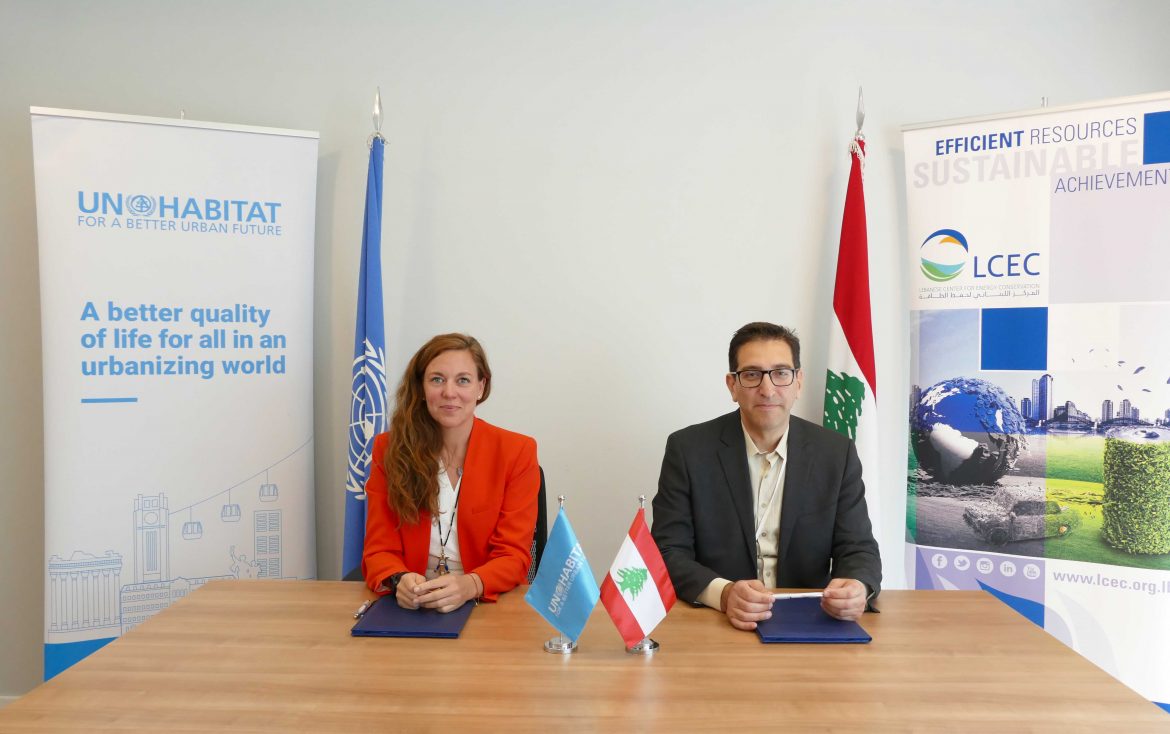A partnership to supply renewable energy solutions to public and civil society institutions.
Beirut, May 23, 2023: As part of its strategic vision to advance sustainable energy solutions for public and civil service and society institutions in Lebanon, UN-Habitat today signed an Agreement of Cooperation with the Lebanese Center for Energy Conservation (LCEC). The cooperation aims to provide holistic technical support for the supply of solar energy systems to enhance the operation and service delivery of various municipalities, unions of municipalities, social and health services centres, and water facilities in Tripoli, Tyre Kaza, Zahle, Beirut and Mount Lebanon.
LCEC will work with UN-Habitat to assess the feasibility and efficiency of implementing solar energy systems in more than twenty pre-selected sites. Following a feasibility study, that will be undertaken by LCEC, shortlisted sites will have needs-based renewable energy interventions implemented. Furthermore, a joint national awareness-raising campaign focused on best practices from selection, installation, and maintenance of the systems, including safety measures to be taken into consideration when installing solar energy systems, will run in parallel.
“While sustainable energy is progressing rapidly in many sectors of the Lebanese economy, some sub-sectors are being left behind and kept in the dark. The importance of this partnership between UN-Habitat and LCEC is that it targets facilities from those unprivileged sub-sectors and supports them to join this green energy transition. Not only will this cooperation improves energy performance within those facilities, but also it would strengthen their role in the societal fabric towards robust, healthier, and safer urban environments. LCEC is so grateful to be able to contribute to this. “said Pierre El Khoury, LCEC General Director and President of the Board.
“Cities are major contributors to climate change – including in Lebanon. According to UN-Habitat, cities consume 78% of the world’s energy and produce more than 60% of greenhouse gas emissions. While Lebanon continues to suffer from a pronounced energy crisis, the sector of renewable energy has seen a remarkable leap in the past couple of years. UN-Habitat has embarked in many projects to address this crisis and through our partnership with LCEC we will be supporting more public institutions and municipalities to embark more green solutions for a better urban future.’’ said Taina Christiansen, Head of UN-Habitat Lebanon.
Since its establishment, UN-Habitat Lebanon has been working effectively with partners and urban planning actors at the community, national and international levels to develop and implement programmes and interventions across the country that contribute to making cities and human settlements inclusive, safe, resilient, and sustainable.
About the United Nations Human Settlements Programme (UN-Habitat)
UN-Habitat works in over 90 countries supporting people in cities and human settlements for a better urban future. Working with governments and local partners, its high impact projects combine world-class expertise and local knowledge to deliver timely and targeted solutions. The 2030 Agenda for Sustainable Development includes a dedicated Goal on cities, SDG 11 – to make cities inclusive, safe, resilient and sustainable.
About the Lebanese Center for Energy Conservation (LCEC)
The LCEC is a non-political not-for-profit organization. LCEC’s mission is to lead the efforts of Lebanon in the development of Energy Efficiency and Renewable Energy to increase energy security and de-carbonization levels. We proactively develop policies, implement projects, and shape the market in harmony with the global sustainable energy transition.

